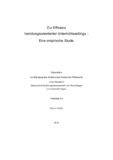Citation link:
https://nbn-resolving.org/urn:nbn:de:hbz:467-6929| DC Field | Value | Language |
|---|---|---|
| dc.contributor.author | Schäfer, Markus | - |
| dc.date.accessioned | 2019-09-02T10:00:05Z | - |
| dc.date.available | 2013-02-4T12:12:12Z | - |
| dc.date.available | 2019-09-02T10:00:05Z | - |
| dc.date.issued | 2012 | - |
| dc.description.abstract | Das funktionale Lernen am realen Objekt erzeugt unmittelbar und direkt Lebenssinn. So unbestritten diese These für das Leben auch sein mag, so schwierig scheint eine Übertragung auf systematische Lernprozesse im Kontext von Unterricht. Schule begegnet diesem Sachstand, indem funktional organisierte betriebliche Arbeits- und Handlungssituationen aus der betrieblichen Rationalität herausgelöst und in kongruente schulische Lernsituationen überführt werden. So glaubt man in der Berufsausbildung die Differenz von Leben und Ausbildung zu einer Synthese zu bringen. Motivations- und lernpsychologisch unterstellt das didaktische Paradigma Handlungsorientierung eine erwartbare Produktivitätssteigerung in der kognitiven Entwicklung dadurch, dass das lernende Subjekt in der Lernsituation betriebliches Erfahrungswissen (lebensnahes Praxiswissen) und schulisches Theoriewissen aktiv und ganzheitlich integriert. Das didaktische Konzept Handlungsorientierung ist in Deutschland politisch gesetzt. Die Dissertation prüfte nun inwieweit Handlungsorientierung im Kontext von Schule und Unterricht die intendierte Produktivitätssteigerung tatsächlich erzeugen kann. Die Studie kommt zum Ergebnis, dass Handlungsorientierung im Kontext von Schule und Unterricht nicht systematisch dazu geeignet ist eine interindividuelle Produktivitätssteigerung in der kognitiven Entwicklung zu bewirken. Die Untersuchungen zeigen vielmehr, dass die individuellen Bilanzen kognitiver Entwicklung nicht primär mit den eingesetzten Methoden korrelieren, sondern mit den psychodynamischen und gesellschaftlichen Implikationen, in denen sich die Lernhandlungen entfalten. Die Studie differenziert die relevanten psychodynamischen Konfigurationen als mentale Formate phänomenologisch aus. | de |
| dc.description.abstract | Functional learning on a real object produces immediately and directly meaning of life. As undisputed this thesis of life may be, the transfer to systematic learning processes in the context of a teaching environment seems more than difficult. The school counters this affair by extracting functionally organized operational labor and actions from operational rationality and converts it into congruent school learning situations. Therefore, professional education tries to create a synthesis for the difference of life and education. Motivation- and learning psychology assumes through the educational paradigm action orientation an expected productivity gain in cognitive development, so that the learning subject within the learning situation actively integrates operational experience (life experience of practical knowledge) and school-based theory. In Germany the didactic concept of action orientation is politically set. The thesis examined the extent of intended productivity gain of action orientation in the context of practical school and classroom. The study concludes that action orientation in the context of practical education and theory is not suitable to effect a systematic inter-individual productivity gain in cognitive development. The studies rather show that the individual accounts of cognitive development do not correlate primarily with the methods used, but with the psychodynamic and social implications, in which the learning activities unfold. The study differentiates the relevant psychodynamic configurations phenomenologically as mental formats. | en |
| dc.identifier.uri | https://dspace.ub.uni-siegen.de/handle/ubsi/692 | - |
| dc.identifier.urn | urn:nbn:de:hbz:467-6929 | - |
| dc.language.iso | de | de |
| dc.rights.uri | https://dspace.ub.uni-siegen.de/static/license.txt | de |
| dc.subject.ddc | 370 Erziehung, Schul- und Bildungswesen | de |
| dc.subject.other | Unterrichtsmethode | de |
| dc.subject.other | mentale Formate | de |
| dc.subject.other | Berufsbildungssystem | de |
| dc.subject.other | Subjektbildung | de |
| dc.subject.other | action-orientied class settings | en |
| dc.subject.other | functional learning | en |
| dc.subject.other | practical education | en |
| dc.subject.swb | Handlungsorientierung | de |
| dc.subject.swb | Duales System | de |
| dc.subject.swb | Unterrichtsforschung | de |
| dc.title | Zur Effizienz handlungsorientierter Unterrichtssettings : eine empirische Studie | de |
| dc.title.alternative | About the efficiency of action-oriented class settings : an empirical study | en |
| dc.type | Doctoral Thesis | de |
| item.fulltext | With Fulltext | - |
| ubsi.date.accepted | 2012-01-19 | - |
| ubsi.publication.affiliation | Fakultät II (Bildung, Architektur, Künste) | de |
| ubsi.subject.ghbs | IGT | - |
| ubsi.type.version | publishedVersion | de |
| Appears in Collections: | Hochschulschriften | |
Files in This Item:
| File | Description | Size | Format | |
|---|---|---|---|---|
| schaefer_markus.pdf | 5.13 MB | Adobe PDF |  View/Open |
This item is protected by original copyright |
Page view(s)
2,300
checked on Dec 1, 2024
Download(s)
1,368
checked on Dec 1, 2024
Google ScholarTM
Check
Items in DSpace are protected by copyright, with all rights reserved, unless otherwise indicated.

